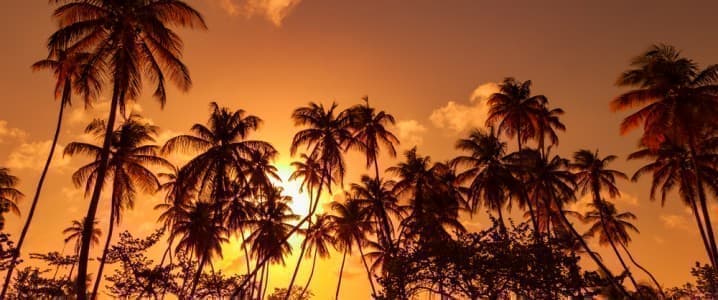The energy sector in the Caribbean is undergoing a huge transformation, from geothermal finds in Dominica to solar energy in Antigua and Barbuda. The long-overlooked region is now attracting high levels of investment, as energy companies see huge potential in its future. Massive investments from international organizations and private funders are expected to spur the development of a strong renewable energy sector across the region over the next decade.
In December 2023, the World Bank announced it was partnering with governments across the Caribbean region to invest almost $500 million in renewable energy to spur sectoral development towards a green transition. The powers will focus on the potential scalability of projects developed with the funding to ensure that the money goes towards establishing an enduring renewable energy sector across the region. The Caribbean is viewed as an area of concern by environmental organizations, as it continues to rely on fossil fuel-based power generation for more than 90 percent of its electricity supply. This has led to high energy costs for consumers and poor energy security. The region is also vulnerable to severe weather events, making diversification key to its energy security.
The World Bank is developing the Caribbean Renewable Energy Infrastructure Investment Facility, under Eastern Caribbean Central Bank leadership, to manage clean energy investments across the region. The organization has had previous success with renewable energy projects in the Caribbean, such as the regional Caribbean Efficient and Green-Energy Buildings project, which incorporated solar panels into public buildings to reduce reliance on fossil fuels. However, the focus with this new funding must be on scalability, to ensure that it has a lasting impact.
In 2023, the U.S. think tank the Atlantic Council proposed a five-step roadmap to transform the region’s energy systems and accelerate the energy transition. The roadmap suggests conducting energy modeling and analysis; modernizing energy grids; diversifying utility structures; creating “bankable” projects; and scaling project investment to national and subregional levels. A World Bank study showed that regional banks and international financial institutions have been reluctant to finance projects in the past because developers have struggled to advance projects to the bankability stage.
The Atlantic Council anticipates an initial investment of between $5 billion to $7 billion to carry out the activities recommended in the roadmap. This includes $1.7 billion to build and upgrade power plants, $455 million in energy efficiency and conservation initiatives; $1.8 billion to introduce new natural gas facilities; and $1.2 billion in renewable-energy investments.
There are several large-scale renewable energy projects already underway in countries across the Caribbean. This year, in the U.S. Virgin Islands, the energy service consultancy Accion Group is carrying out an auction for 128MW solar and 63.2MWh battery energy storage owned by VIElectron. This is in response to the declaration of an energy emergency making the need for greater diversification abundantly clear.
In Dominica, experts believe there may be huge potential for geothermal energy. Fred John, the head of the government-owned Dominica Geothermal Development Corporation stated, “We’ve found an excellent geothermal reservoir in Roseau Valley, around a thousand meters down.” He added, “We’ve built two wells – one to bring up the hot water and another to return it back down to the reservoir – so it’s a closed loop system. We have chosen the technology that is the most environmentally friendly and best in class.”
The government is hopeful that this project will help develop the country’s green energy industry having been discussing the potential of geothermal energy under Dominica for several decades. Vince Henderson, the Minister of Foreign Affairs in Dominica, explained the reason for not exploring geothermal resources in previous years. Henderson stated, “Developing geothermal power is very expensive, particularly for remote island States. We were fortunate because we received a combination of grants and concessional loans in order to get to where we are.” He added, “If the international community is serious, there has to be some upfront investment by way of grant funding.”
Meanwhile, Antigua and Barbuda are focusing on solar power. In March, the UAE-Caribbean Renewable Energy Fund (UAE-CREF) launched a hurricane-resistant solar and battery power project in Barbuda, to provide a sustainable supply of electrical power. The hybrid solar, batteries, and backup diesel project is known as the Green Barbuda project. It supports Antigua and Barbuda’s aim of producing 86 percent of its electricity from renewable sources by 2030.
The solar park has been built to withstand winds of up to 265km an hour, which is key in a region that is so prone to extreme weather events. The $50 million project was financed by the Abu Dhabi Fund for Development and will be operated by Masdar. It forms part of the larger UAE-CREF partnership, which aims to decrease energy costs, boost energy access, and enhance climate resilience across 16 Caribbean countries.
Although renewable energy development in the Caribbean has been slow in the past, largely due to the lack of adequate planning and expertise, the region is set to undergo a major transformation in the coming decades. Several international banks and private investors are financing scalable green energy projects across the region, which are expected to help develop a resilient renewable energy sector, which will contribute to reduced energy costs and greater energy security.
ADVERTISEMENT
By Felicity Bradstock for Oilprice.com
More Top Reads From Oilprice.com:
- Mexico Raises Proven Hydrocarbon Reserves Figure
- Europe's Shift from Russian Gas to Pricey LNG
- Matador Resources to Buy More Permian Assets in $1.9B Deal

















